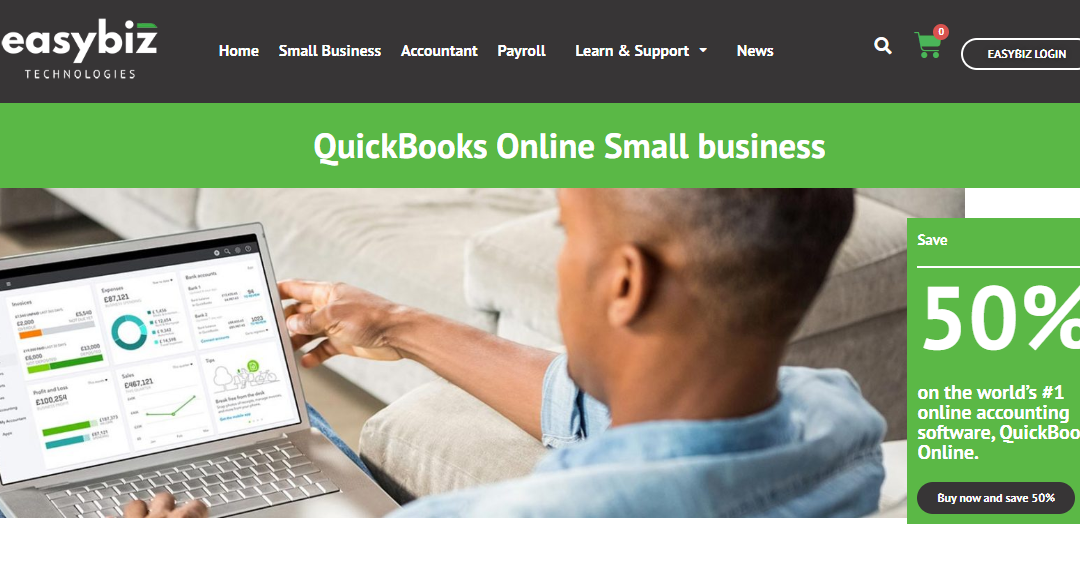Studies show that one of the top reasons businesses fail is because they have a cash flow problem. This is particularly true of small- to medium-sized enterprises (SMEs) and start-ups. A significant cause of cash flow problems is the fact that businesses often don’t receive payments on time – or at all. However, practices can be put in place to safeguard a business in lean times, and the Government can also play a role in supporting SMEs.
Gary Epstein, MD of EasyBiz Technologies, the authorised local partner for QuickBooks Online in South Africa, weighs in on the importance of cash flow management and how to achieve it.
According to McKinsey & Company, SMEs across South Africa employ between 50 and 60 percent of the country’s workforce across all sectors, are responsible for a quarter of job growth in the private sector and contribute 39% to the country’s GDP. They are therefore vital to the economy, yet keeping their doors open is a constant challenge.
The effects of poor cash flow on a business can be far-reaching. Business-owners can struggle to pay salaries and bonuses and could be forced to pay their suppliers late. They could also miss debt payments, which would result in a lower credit rating and less chance of having loans approved.
Opportunities to grow the business through investment could also be missed. Poor cash flow can have a negative impact on marketing strategies and competitive advantages and can cause the business to lose out on early payment discounts.
Cash is king when it comes to the financial management of a growing company. The lag between the time companies must pay their suppliers and employees, and the time they collect from their customers, is the problem; and the solution is cash flow management. In simple terms, cash flow management means delaying outlays of cash, if possible, while encouraging anyone who owes the business money to pay it as quickly as possible.
The following guidelines can help businesses recoup money that is owed to them and manage cash flow more effectively:
-
Offer incentives and early settlement discounts.
-
Invoice early in the month, as many companies do a monthly payment run.
-
Set non-negotiable payment due dates.
-
Digitise your invoicing, collections, and outstanding payments with accounting software.
-
Offer simple and efficient payment methods.
-
Encourage debit order payments.
-
Track accounts receivable to identify and avoid slow-paying customers. Instituting a policy of cash on delivery (COD) is an alternative to refusing to do business with slow-paying customers.
-
Ensure a quality customer experience so that there are no comebacks or avoidance of payment.
-
Build cash reserves to cover expenses in lean times.
-
Reduce expenses to what is required and avoid unnecessary purchases.
-
Reduce slow-moving stock by selling it for what you can get.
Even if a company is making a profit by making more revenue than it incurs in expenses, it will have to manage its cash flow correctly to be successful. A company’s cash flow is tied to its operations or business activities, to its investment activities (such as the purchase or the sale of capital equipment), and to its financing activities (such as raising debt or equity funding or repaying such funding). The cash that a company generates from its operations is tied to its core business activities and provides the best opportunities for cash flow management.
Apart from the measures companies can take in keeping their cash flow healthy and their business intact, the South African Government can also do its bit in ensuring that SMEs are given as much support as possible. Recently, the National Treasury announced that it had set aside R15bn to backstop loans for businesses with a maximum turnover of R100m that have been adversely affected by the floods, the riots last July, as well as the pandemic.
This latest scheme will be accessed through commercial banks, non-traditional SME funders and development finance institutions. Loan amounts ranging from a minimum of R10 000 to a maximum of R10m will be available to qualifying businesses.
In addition, government departments can support small businesses in other ways, for example, when SMEs win government contracts, Government can commit to a 30-day payment policy. Contracts by government departments can be validated and approved based on the availability of funds to pay service providers.
To conclude, while cash flow difficulties result in the demise of many enterprises, with effective cash flow management, which involves a healthy control of incoming and outgoing cash, this can be avoided. With extra help from available resources like accounting software to report on cash flow status, as well as facilities to send and track invoices and payments, SMEs have a good chance of staying the course and going from strength to strength.


